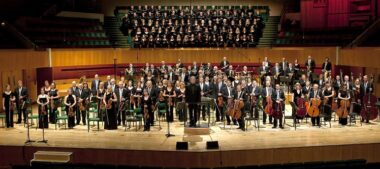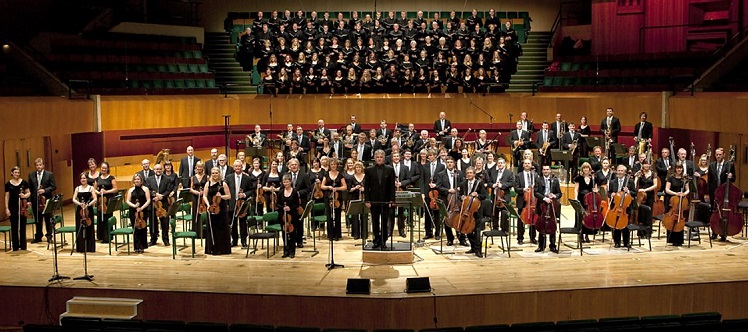 United Kingdom Bach: Jeremy Budd (tenor, Evangelist), David Shipley (bass, Christ), Mhairi Lawson (soprano), Jess Dandy (contralto), Anthony Gregory (tenor), James Newby (bass), BBC National Chorus and Orchestra of Wales / Harry Bicket (conductor). St David’s Hall, Cardiff, 9.4.2022. (PCG)
United Kingdom Bach: Jeremy Budd (tenor, Evangelist), David Shipley (bass, Christ), Mhairi Lawson (soprano), Jess Dandy (contralto), Anthony Gregory (tenor), James Newby (bass), BBC National Chorus and Orchestra of Wales / Harry Bicket (conductor). St David’s Hall, Cardiff, 9.4.2022. (PCG)

Bach – St Matthew Passion
I have suffered in my youth from over-religiose, seemingly unending, performances of scores which Bach wrote for his Leipzig church appointments. I am eternally grateful to the authenticist brigade who rescued this music from its solemn exponents and let us hear the freshness and delight of Bach’s inspiration with new ears. But I sometimes wonder if the reforms have not gone too far? We now get performances that deliberately seek to underplay Bach’s concerns with his texts; they either minimise the drama of their presentation or reduce the number of performers to the bare minimum consistent with the economic circumstances forced on the composer by the cheese-paring employers of whom he so frequently complained. That is particularly the case with the St Matthew Passion.
The Passion is the largest-scale work which Bach incontrovertibly heard performed in his lifetime. Its specified forces include a double choir and orchestra, and the score comprises at least 31 notated individual lines, some of which – in the absence of a congregation/audience prepared to join in the chorales – clearly expected several performers to a line. The scale indeed bids fair to challenge the scores Biber wrote a quarter of a century earlier for his more extravagant and better-upholstered Cathedral commissions from Roman Catholic sources – quite a long distance from the parsimonious concerns for economy Bach usually faced from his Protestant church committee. By the same token, we should expect a degree of grandeur in the performance. The opening chorus, with its nine choral lines and antiphonally arranged orchestra, should sound like the primal funeral lament it depicts, not like a courtly sarabande more suited to the civilised atmosphere of Saint-Souci. (Even in the next generation, one doubts that the free-thinking Frederick the Great would have expected that.) Bach did not help by his persistent failure to provide any tempo directions – he obviously relied on his own participation in performances – except an exceptional use of Adagio for Christ’s Eli, Eli, lama asabthani? (My God, my God, why hast Thou forsaken me?). One should perhaps have anticipated that anyway.
As it happens, this performance – led by the period specialist Harry Bicket – in places fell uncomfortably between two stools. The larger forces of the chorus and orchestra were correctly divided into two well-separated bodies left and right on the stage. They produced a splendid sound, but they seemed sometimes too peremptory, with speeds just a little too fast to convey the proper sense of mourning. This was noticeable from the start. The richness of the acoustic was just a little too comfortable for the edgy altercations between the choral bodies: Sehet! Wen? The same goes for the great choral prelude which concludes the first half of the work, enjoining mankind to bewail their grievous sins. It seemed a little too hustled and bustled in a manner that might not have been so evident in a performance with a smaller body of performers.
The hour-long interval, to let members of the afternoon audience enjoy a cream tea, also served to dissipate any tension that had been previously generated. The following scenes before the high priests and Pilate seemed to last rather longer than desirable before the emotions were once again engaged. In the same manner, the reaction of the chorus, Wahrlich, dieser ist Gottes Sohn gewesen (Truly, this was the Son of God), should surely sound awestruck in any performance. Here, it seemed rather bland and smooth; the preceding depiction of the earthquake also did not have a shattering effect. And in the final chorus Bach’s sublime descending scales in the middle section failed to elicit the desired sense of ecstatic involvement that surely is sought here, leading to a straightforwardly almost march-like recapitulation of the opening material; that in turn seemed rather unsteady in the closing bars, as it slowed down towards the grating suspension from the four flutes in the final chord.
Then again, others may have found the combination of larger forces with a more forthright approach to the music refreshing or indeed inspirational. The audience, such as it was, certainly responded with enthusiasm to the interpretation, and the performances were generally excellent. Jeremy Budd stood in at the last minute as Evangelist for an indisposed Gwilym Bowen. He might have been happier in a period performance with more modest forces (his voice was noticeably smaller than the others, not entirely the result of his more backward placing on the stage) but he rose with excitement to the more dramatic passages and was nimble in his handling of the German text. The other soloists were more conventionally operatic. Jess Dandy and Mhairi Lawson were superbly lyrical. Their respective duets with Leslie Hatfield on violin in Erbarme dich and with Matthew Featherstone on flute in Aus Liebe will mein Heiland sterben were real highlights, and the interplay between voice and instrument was beautifully handled.
Anthony Gregory in the tenor solos had rather less to do, and James Newby was landed with perhaps the most intractable material in the score: the extensive solos during the crucifixion, where his lower notes sometimes lacked definition. Best of all was David Shipley as Christus. He blended warmly with his halo of strings and broke the heart when they suddenly ceased at his cry of Eli! beautifully echoed in translation by Budd’s Evangelist. The choral singing was superbly incisive as they enthusiastically took on the role of the crowd. They reserved a real climax for Sind Blitze, sind Donner in Wolken verschwunden? (Have lightning and thunders their fury forgotten?) only to have the generated excitement dissipate during that extended interval.
I realise that the performance was conceived two years ago for broadcast – it will be featured in an evening concert on BBC Radio 3 on 13 April – but perhaps the narrative might have been more gripping if it had been in English. The BBC did their best to compensate. They supplied free of charge a very substantial English and Welsh programme with the original German and parallel English (although not Welsh) in Peggy Cochrane’s rather pedestrian English translation for Decca in the 1960s. ‘We sit upon the ground in tears’ may be a precise rendition of Wir setzen uns mit Tränen nieder, but it lacks the poetry that ‘In tears of grief’ conveys.
I was disconcerted by the poor attendance, despite the enticement of the cream tea during the interval. The auditorium seemed to be little more than a quarter full, whereas concerts given in this hall by the BBC National Chorus of Wales have always tended to attract near-capacity audiences. The performance began at two in the afternoon to allow for the tea interval and concluded at nearly six. Given the continuing disruption of public transport timetables following the pandemic, that may have deterred some potential listeners. One would very much hope that audiences will take their courage in their hands and begin once again to support the BBC in their programmes in Cardiff in the manner that they deserve. As it is, this concert may have been delayed by two years, but it has now finally materialised. After its broadcast it will continue to be available on BBC Sounds. Hopefully, this will capture the stereo separation which was so carefully and persuasively preserved in the hall.
Paul Corfield Godfrey
